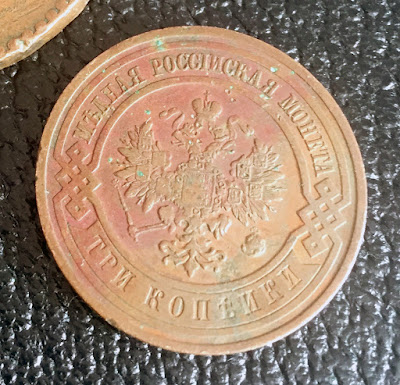The Stove
When they came round to do the fatal deed,
heavily armed with things made out of iron,
nobody tried to stop them. I alone,
heavily armed with greedy curiosity,
turned up to watch. I saw the first appalling
and to all purposes decisive blow
of the sledgehammer. Crunch. Then heavy breathing.
The dust swirled up, a sort of greyish bowel
over a noggin now split into two, and
a pair of green-tinged copper eyes glanced up
at me from off the bottom, or below it—
the abyss that’s ever-present under us.
3 kopeks. Heads
The eagle’s looking westward. Eastward too.
The eagle’s gaze is desolate and cruel.
In one the folk arises from its slumber.
There’s lemon-coloured sunset in the other.
And Aleksandr Blok’s between the two.
The eagle stares and stares. Copper alone
knows how to stare like that, so very slow.
The eagle watches—in a way we can’t,
even if like him we happen to have four eyes—at
the onslaught of the provisional class, and of
the darkness.
3 kopeks. Tails
The two loops of the curly number 3
are not for nothing, as you must agree,
the letter yat—showing where we get ‘kopek’—
stands with its cross, wearing a monkish skullcap,
a tiny Kuzmin smile inside there, see?
Standing or sitting? Only yat can sit
or stand so there’s no telling which it is.
He’s half worn smooth, and it’s as if he’s conscious
that given his two-sided character
he’s obsolete, that with the coming strife
he’ll be abolished.
Good stovemaker! Into that stove’s foundation
you tossed these coins as people do, for luck,
not thinking that with these three-kopek pieces
you’d purchase so much of eternity.
I feel exalted by their quiet ringing,
and like the magic ruble in the tale,
they’re always in my pocket, jingle-jingling.
Lots more they’re going to buy me, without fail.
[From Тайный советник (Privy Councillor), 1987]
Translator's notes:
‘Showing where we get ‘kopek’’: kopek coins originally featured a figure of St George with his lance, in Russian kop′yo.
‘The magic ruble’ refers to a story by Nikolai Leskov (1831-95), ‘Тhe Ruble that Cannot be Exchanged’, which begins: ‘There is a belief according to which one may acquire a ruble that cannot be exchanged, i.e. such a ruble that no matter how many times you proffer it, it will always remain whole in your pocket. But to get hold of such a ruble you have to endure massive terrors…’
(Translation © 2015 G.S. Smith)
Печка
Когда они пришли покончить с ней,
вооруженные железными вещами,
никто не заступился. Только я,
вооруженный жадным любопытством,
пришел глядеть. Я видел первый страшный
и в сущности решающий удар
кувальды. Хруст. Тяжелое дыханье.
Взметнулась пыль, как седенькая кичка
над надвое расколотой башкой,
и с прозеленью медные глаза
взглянули на меня со дна, с поддона,
из бездны, что всегда под нашим дном.
3 копейки. Орел
Орел глядит на Запад и Восток.
Орлиный зрак пустынен и жесток.
Там поднимается проклятьем заклейменный.
Там занимается закат лимонный.
Посередине Александр Блок.
Орел глядит вовсю. Знать, только медь
умеет так медлительно глядеть.
Орел глядит, как не умеем мы,
хотя есть и у нас четыре глаза,
на наступленье временного класса,
на наступленье тьмы.
3 копейки. Решка
Два завитка кудрявой цифры 3
не тривиальны, что ни говори,
и буква ять, след от копья в копейке,
стоит с крестом, в монашеской скуфейке,
с кузминскою улыбочкой внутри.
Стоит или сидит? Знать, только ять
умеет так сидеть или стоять.
Ять полустерт, как-будто знает он,
что со своей природою двойною
он устарел, что новою войною
он будет отменен.
Печник, печник! ты в основанье печки
монетки кинул просто так, на счастье,
не думал ты, что на свои алтыны
сумеешь столько вечности купить.
Их тихий звон внушает ликованье,
подобно неразменному рублю
они всегда звенят в моем кармане.
Я многое на них еще куплю.





